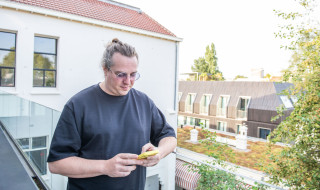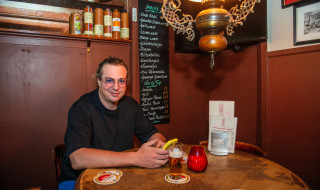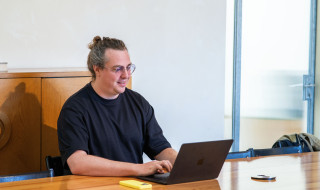"After a demonstration on 'word embeddings', I was sold!"
”The time of top-down purchasing of IT solutions is over”
Bob van Luijt is CEO of Weaviate, a rapidly growing and successful database company where - via an open source cloud platform - the focus is on the development of AI-native applications. Besides having an outspoken opinion on his field, Van Luijt is not afraid to speak his mind when it comes to topics such as business and leadership.
"Around 2015, I had a job with a large publisher of scientific publications," is how 38-year-old Bob van Luijt looks back on his first encounter with machine learning. "That publisher was struggling with the future of its business model. How to proceed when all publications will soon be available for free via open access? I spoke about this with their head of Data Science. He introduced the phenomenon of 'word embeddings' and gave a demonstration. I had never seen anything like it before!
A machine learning model produced a csv file, in which there was a vector embedding after each word. That vector embedding looked like a bundle of coordinates. Like how a navigation system works with X, Y and Z coordinates, only with hundredfold coordinates. Those embeddings allowed you to 'do the math' with words and determine the relationships between them. From then on, I was sold."

"The company's image also plays an important role. That's why I created a cool, digital community, where people like to work together.
Pizza and beer
After studying at ArtEZ and Berklee College of Music, it took Van Luijt another five years to actually turn his wonder into a project plan for his own business.
"How do you make sure your brand or business resonates with people? What is your niche in the market and how can you differentiate yourself?"
"I clearly remember flying to New York for my first developers' meet-up. I provided beer and pizza, but no one showed up at all. Only after banging on all the digital pots and pans long enough and making enough noise did I get more wind under my wings. At some point, the penny dropped that the company's image also plays an important role. So I created a cool, digital community, where people like to work together. It's an open secret in our industry: we think it's smart to express our scientific and technical expertise at conferences. But in the end, customers buy products from a brand they feel at home with. It's mostly about emotional decisions. So how do you make sure your brand or company resonates with people? What is your niche in the market and how can you differentiate yourself? Not by trying to 'please' everyone. Focus mainly on the group you think will feel at home with you."
Earnings model
Founded in 2019, Weaviate can now boast over 15,000,000 downloads, more than 90 employees, some 6,500 community members and around 1,000 customers.
"We provide a cloud database that enables developers of AI applications to search, store and share data more easily. Our specific focus is on vector embedding. With this, simply put, we ensure that coordinates are connected via machine learning models."
"The commercial success," Van Luijt continues as we zoom in on Weaviate's revenue model, "does not depend on a licence of the software. Instead, we look at the service around it, at the operational side of the database. That it works and scales optimally with our customers. We also offer things like Service License Agreements (SLAs). These mainly concern integration and training at partners. We also earn from the tooling and the whole ecosystem around the database."

Weaviate has no office, everyone works remotely. Bob van Luijt often works from his mobile and also often in a café.
Taylor Swift
The Weaviate database is available as open source software and can therefore count on a wide group of interested developers. However, you won't find them overnight.
"The open source community is really quite large. So if you start your own open source company, you will first have to conquer a place in that community. Only later does the go-to-market come into the picture. If you do it smartly, you won't need marketers; the community will create brand awareness. That is why it is important to go to tech conferences and post on forums early on."
"If you develop something closed source, you bake a cake that you can eat all at once. If you develop in open source, then that cake is much bigger and keeps growing as well. Our challenge is to get as many people as possible to eat that cake continuously."
"Whether open source lags behind big tech in development? Well, I don't think so. If you look at the NASDAQ, you come across many open source software providers there, such as Elastic, HashiCorp and Confluence. Every developer is a potential user of our database. Then we are talking about, I believe, about 20 to 30 million professional developers worldwide. That seems like a lot, but Taylor Swift has considerably more followers."
Ebb and flow
"Building a business is not that difficult. First, I make sure I have a clear vision and strategy. I then share that with all employees. I also look at setting up an appropriate culture. That is mainly about finding good, reliable people who together form a close-knit group and all want to work on that vision from their own niche or expertise. We do not suffer from a tight labour market. In our particular field, many people find it interesting to work on AI applications. I am reminded of Warren Buffett's famous quote, "Only when the tide recedes do you discover who has been swimming naked." Now the tide is out and we are surfing along contentedly on the waves."

Weaviate was voted by Forbes as one of the 50 most promising AI startups of 2024.
Big and small dogs
On 13 December at Naturalis, Bob van Luijt will be one of the keynote speakers at the first Open Source Leadership Summit. What message does he have for leaders and pioneers in our field?
"The time is past when IT solutions are bought top-down. Let developers adopt new techniques or innovations. Then they will naturally 'tell the top down' what is needed. Therefore, always listen carefully to your developers. When I was just starting out, I saw people with a financial background or business school education ending up at the top of companies. These days, they no longer speak the right language. Even in banks, for example, you already see more and more people with a tech background calling the shots. It is also much easier to learn the right business skills with a tech background than the other way around."
"I very much believe in the type of leadership where there is an eye and ear for everything that happens on the shop floor. On YouTube, I saw a video at a CIO conference of a presentation by Frank Slootman. He is the ex-CEO of Snowflake who took the company public. In one of his first slides, he showed a big dog with a smaller one next to it. He said: 'That big one? That's me. That little one, that's you guys.' So I find this very witty. He explained that in his career he has fired more CIOs than he has hired. Because, Slootman said, he had no use for CIOs telling him what can't be done. Slootman had only one focus: growing the business. He only listens to people with good ideas and then it doesn't matter where they are in the organisation. That's leadership."

"You have to innovate to stay relevant and through that innovation you enthuse the organisation."
Positive impact
Good ideas sometimes come with 'ifs and buts'. We mention the developments in AI and highlight the issues around copyright protection and data security.
"If you react very 'blue' and define what can't be done with AI within a company, you immediately create roadblocks. That has an impact on the culture within the organisation, because many people are not happy with imposed restrictions on exploring and expanding knowledge. If you allow it without restrictions, you will see a positive impact on employee enthusiasm. And on revenue. If leadership blocks the flywheel of the organisation, the machine will not start running. This is irrevocably at the expense of revenue. If you don't innovate and develop, you will eventually make the organisation obsolete. The knife cuts both ways. You have to innovate to stay relevant and through that innovation you enthuse the organisation. Make sure your innovations are a 'win-win' for the partners you work with. Is that easy? No, of course it isn't. But if you don't do it, they will look to others."
About Bob van Luijt
Bob van Luijt is CEO of Weaviate, chair of the Creative Software Foundation and angel investor. A fully remote company with employees worldwide, Weaviate provides an open source vector database on which AI applications can be built. His company is valued at around $200 million in 2023. Van Luijt has a background in jazz music, he studied at Berklee College of Music.
Text: Edwin Ammerlaan
Photos: Vera Duivenvoorden
Interested in more personal stories about the impact of our innovations?
Meer lezen?
Podcast
What you need to know about... Nextcloud
The dependence on one dominant tech supplier for communication and data storage is raising more and more questions in education and research. How do you keep control of your data? What alternatives are there? And what does that require from institutions?Magazine
UU and SURF prompt Microsoft to make global adaptation in Windows disk encryption
Utrecht University and SURF managed to get Microsoft to make a fundamental change to BitLocker's disk encryption. But what does this mean in the long term for the autonomy of the education and research sector?Story
"AI can be applied in education and research in a values-driven way"
Digital transition has been a central theme throughout Alexandra van Huffelen’s career. Now, as president of the Executive Board of Radboud University Nijmegen, she is committed to digital autonomy and the development of the region.
